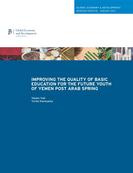After the Spring: Inclusive Growth in the Arab World

The democratization movement known as “Arab Spring” in the Arab countries of the Middle East and the North Africa regions swept away the existing political system and socio-economic mechanism. Decades-long autocratic rule were collapsed in Egypt and Tunisia, which many citizens who had been unfairly treated expected that the state of politics, economics, and civil society would be rapidly ameliorated. However, almost two years later, frequent violent protests against a new political regime are taking place in Egypt, while the unemployment rate in Tunisia has risen higher than that of the former dictatorship era.
In order to make a smooth transition to democracy and social stability, the governments of Arab countries and their development partners have strived to adjust their economic policies and assistance programs to respond to the demands for inclusive growth and social justice.
JICA and the Brookings Institution have advanced a joint research on inclusive growth in the Arab region, and have published five papers based on the research findings. These papers focusing on the four countries—Egypt, Tunisia, Yemen and Iraq, cover three important dimensions of inclusive development: 1) economic opportunities for youth, 2) education, and 3) voice of citizens and good governance. These five papers include the one entitled Improving the Quality of Basic Education for the Future Youth of Yemen Post Arab Spring, which JICA-RI Research Fellow Takako Yuki and Research Assistant Yuriko Kameyama had worked on.
scroll